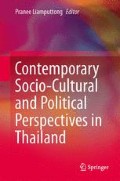Abstract
Thailand’s participatory slum upgrading programme, the Baan Mankong “secure housing” programme, which has benefited over 90,000 households, has spurned on a wider process of change amongst Thai urban poor communities. From a process of community savings to participatory upgrading of slums, the National Union of Low Income Community Organisations (NULICO) arose, and has become a key driver for community development in Thai cities. The network has gradually established firm relations with local government officials and has benefited from the support of the Community Organisations Development Institute (CODI), a state agency. NULICO and CODI have introduced a number of innovations to urban community development, such as a community-based insurance system and city-level Community Development Funds (CDFs). These CDFs run in collaboration with city authorities and allow for citywide upgrading, in order to achieve “cities without slums”, as well as providing income-generating and other revolving loans. From two CDFs in 2009, there are now over 60 CDFs established and over 200 in the pipeline. A new politics of change has emerged in cities as a consequence of the Baan Mankong programme, influencing the urban development of Thailand’s cities. Low-income communities are playing an increasingly important role in city development, with consequences for civic participation and democratisation of Thai grass roots.
Access this chapter
Tax calculation will be finalised at checkout
Purchases are for personal use only
Notes
- 1.
Originally the Urban Community Development Organisation (UCDO), CODI, emerged in 2000 when UCDO was merged with the Rural Development Fund to work on supporting community-driven development across Thailand. CODI operates under the Ministry of Social Development and Human Security.
References
ACHR. (2008). E-news: April – May – June 2008. Retrieved February 1, 2012, from: http://www.achr.net/Download%20Library/Download%20Enews/ACHR%20E-news%20April-May-June%202008.pdf
Archer, D. (2012). Finance as the key to unlocking community potential savings, funds and the ACCA programme. Environment + Urbanization, 24(2), 423–440.
Boonyabancha, S. (2009). Land for housing the poor by the poor: Experiences from the Baan Mankong national de Slum upgrading programme in Thailand. Environment + Urbanization, 21(2), 309–330.
Bowen, G. A. (2008). An analysis of citizen participation in anti-poverty programmes. Community Development Journal, 43(1), 65–78.
Fox, J. (2005). Empowerment and institutional change: Mapping “virtuous circles” of state-society interaction. Revised version of paper presented at the Working meeting on Power, Rights and Poverty Reduction, March 23–24, 2004, Washington, DC. Retrieved January 23, 2012, from: http://www.uia.mx/campus/publicaciones/IIDSES/2Empowerment.pdf
Gaventa, J. (2004). Towards participatory governance: Assessing the transformative possibilities. In S. Hickey & G. Mohan (Eds.), Participation: From tyranny to transformation? Exploring new approaches to participation in development (pp. 25–41). London: Zed Books.
Harriss, J. (2007, June 30). Antinomies of empowerment, observations on civil society, politics and urban governance in India. Economic and Political Weekly, 2716–2724.
Krishna, A. (2002). Active social capital: Tracing the roots of development and democracy. New York: Columbia University Press.
Mansuri, G., & Rao, V. (2004). Community-based and -driven development: A critical review. The World Bank Research Observer, 19(1), 1–39.
Mitlin, D. (2008). With and beyond the state – Co-production as a route to political influence, power and transformation for grassroots organizations. Environment and Urbanization, 20(2), 339–360.
Mosse, D. (2005). Power relations and poverty reduction. In R. Alsop (Ed.), Power, rights and poverty: Concepts and connections (pp. 51–67). Washington, DC: World Bank.
Murphy, C. (2009, June 5). Populism erodes Thailand’s old order. Far Eastern Economic Review, 172, 7–12. Retrieved January 18, 2013, from: http://facthai.wordpress.com/2009/06/12/populism-vs-thailands-old-guard-feer/
Putnam, R. (1998). Foreword. Housing Policy Debate, 9(1), v–vii.
Putnam, R. D., with Leonardi, R., & Nanetti, R. Y. (1993). Making democracy work: Civic traditions in modern Italy. Princeton: Princeton University Press.
Williams, G. (2004). Evaluating participatory development: Tyranny, power and (re)politicization. Third World Quarterly, 25(3), 558–578.
Woolcock, M. (2001). The place of social capital in understanding social and economic outcomes. Retrieved January 24, 2012, from: http://www.oecd.org/dataoecd/5/13/1824913.pdf
Woolcock, M., & Narayan, D. (2000). Social capital: Implications for development theory, research, and policy. The World Bank Research Observer, 15(2), 225–249.
Acknowledgements
My thanks go to the Asian Coalition for Housing Rights (ACHR) for developing my understanding of CDFs in Asia. Any mistakes in this text are my own.
Author information
Authors and Affiliations
Corresponding author
Editor information
Editors and Affiliations
Rights and permissions
Copyright information
© 2014 Springer Science+Business Media Dordrecht
About this chapter
Cite this chapter
Archer, D. (2014). The Politics of Change in Thai Cities: The Urban Poor as Development Catalysts. In: Liamputtong, P. (eds) Contemporary Socio-Cultural and Political Perspectives in Thailand. Springer, Dordrecht. https://doi.org/10.1007/978-94-007-7244-1_14
Download citation
DOI: https://doi.org/10.1007/978-94-007-7244-1_14
Published:
Publisher Name: Springer, Dordrecht
Print ISBN: 978-94-007-7243-4
Online ISBN: 978-94-007-7244-1
eBook Packages: Humanities, Social Sciences and LawSocial Sciences (R0)

